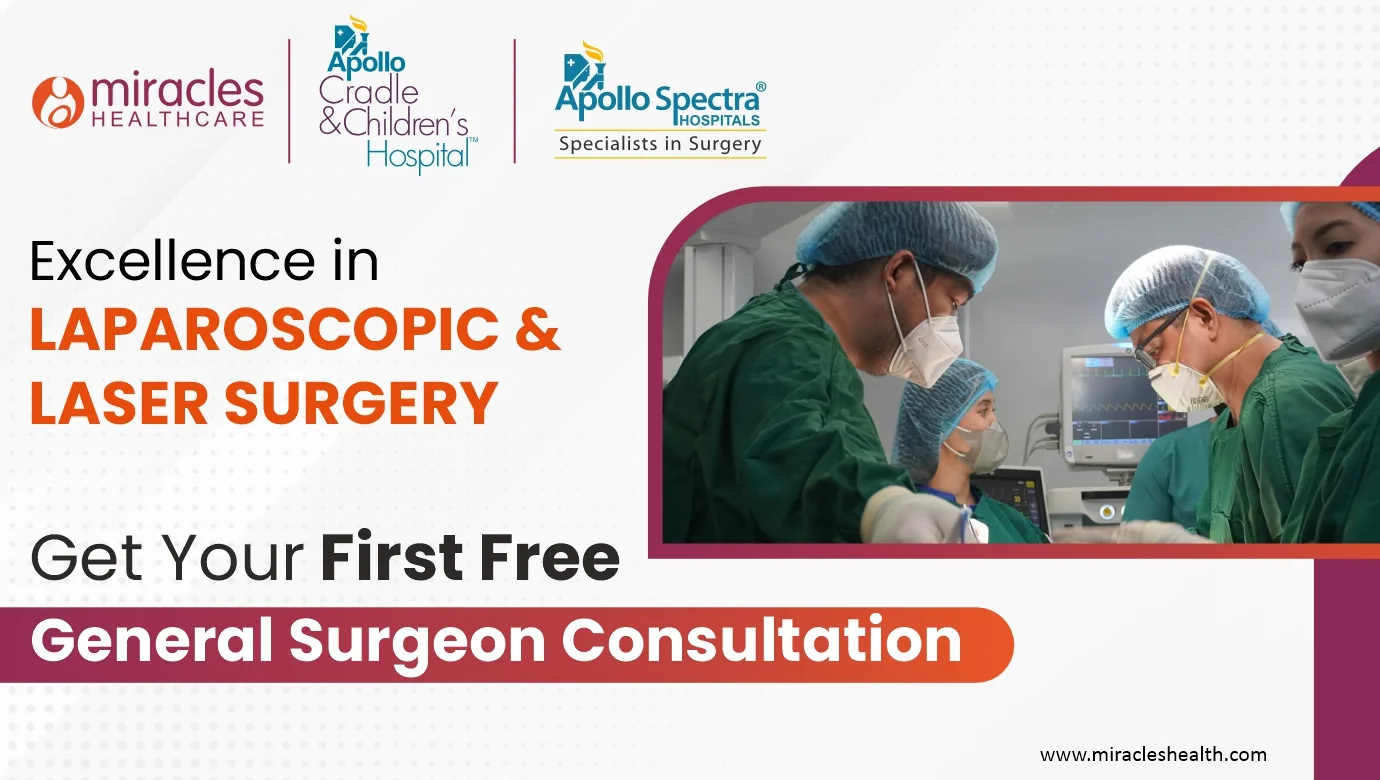General Surgery Conditions We Treat
Comprehensive Care for Your Health

Laser pilonidal sinus surgery involves using laser energy to remove infected tissue and promote healing in the pilonidal sinus. It is a condition indicated by the development of small cysts or pimples near the tailbone. This minimally invasive procedure helps to reduce recurrence rates and improve recovery compared to traditional surgical methods, offering a promising alternative for patients with this condition.
Pilonidal sinus is a chronic skin condition marked by the formation of small cysts or pimples near the tailbone, generally occurring in the cleft between the buttocks. These small cysts include hair and debris, leading to infection, inflammation, and the formation of sinus tracts or tunnels under the skin. Symptoms the patients may experience include pain, swelling, redness, and drainage of pus or blood.
Laser pilonidal sinus surgery is a minimally invasive procedure that uses laser energy to target and remove infected tissue, including hair follicles and debris, while closing off the sinus tracts. This procedure helps facilitate faster healing, reduce recurrence rates, minimize post-operative pain, and improve recovery time compared to traditional surgical methods.
Pilonidal sinus laser surgery is generally recommended when traditional surgical approaches fail to manage the condition or when patients seek a minimally invasive alternative with potentially improved outcomes. Here are some reasons why laser treatment might be required:
Minimally Invasive: Laser treatment for pilonidal sinus offers a less invasive option than traditional surgery, resulting in smaller incisions, less tissue damage, and potentially faster recovery times.
Reduced Recurrence: By effectively targeting and closing the sinus tracts, laser treatment may reduce the chance of recurrence compared to traditional surgical methods.
Faster Healing: Laser energy can promote faster healing by effectively removing infected tissue, including hair follicles and debris, while also stimulating tissue regeneration.
Reduced Pain and Discomfort: The minimally invasive nature may result in less post- operative pain and discomfort for patients than conventional surgery.
Outpatient Procedure: Laser pilonidal sinus surgery is often performed on an outpatient basis, allowing patients to return home the same day and resume normal activities sooner.
The ideal candidates for pilonidal sinus laser surgery generally include individuals who:
Individuals diagnosed with pilonidal sinus through clinical examination and imaging studies.
Have recurrent or chronic pilonidal sinus that didn't respond well to conservative treatments such as antibiotics or incision and drainage.
Are seeking faster recovery times, reduced pain, and lower recurrence rates.
Have a fairly small to moderate-sized sinus tract or abscess that is suitable for treatment with laser energy.
Are in overall good health and do not have any contraindications to undergo a minimally invasive procedure under local or general anesthesia.
However, candidacy for laser pilonidal sinus treatment is determined based on the individual's specific condition, medical history, and treatment goals.
Preparing for laser pilonidal sinus treatment involves various steps to ensure the procedure goes smoothly and recovery is successful:
The very first step is mental preparation. Take time to mentally prepare for the procedure by addressing any concerns or anxieties you may have.
Schedule a consultation with a general surgeon specializing in laser treatment for pilonidal sinus. Discuss your complete medical history, current medications, and any allergies or previous surgeries. Discuss the procedure with your surgeon and asking any questions can help ease fears and ensure you feel informed and confident.
Your surgeon may order different imaging studies such as ultrasound or MRI to evaluate the extent and location of the sinus tracts and abscesses, helping to plan the laser treatment approach.
Follow any pre-operative instructions provided by your surgeon, which may include guidelines for fasting before the procedure, discontinuing specific medications, and cleansing the surgical site.
Wear loose, comfortable clothing on the day of the procedure, as this will help you feel more relaxed and allow for easy access to the surgical site.
By following these preparation steps in consultation with your surgeon, you can help ensure a smooth and successful laser treatment for the pilonidal sinus experience.
Laser pilonidal sinus surgery typically requires these general steps:
Anesthesia: Before the procedure starts, the patient is given local anesthesia to numb the area around the pilonidal sinus. In some cases, general anesthesia may be recommended.
Cleaning and Preparation: The surgical site is thoroughly cleaned and sterilized to reduce the risk of infection. The patient is positioned comfortably to allow access to the pilonidal sinus.
Laser Treatment: A specialized laser device is used to precisely target and remove infected tissue, hair follicles, and debris from the sinus tracts. The laser energy effectively seals off the sinus tracts, preventing further infection and promoting faster healing.
Wound Closure: Once the infected tissue has been removed and the sinus tracts closed, the surgical site may be left open to heal naturally or sealed with sutures or strips, based on the surgeon's preference and the duration of the procedure.
Dressing and Recovery: The surgical site is dressed with sterile bandages or dressings to protect the wound and promote healing.
Laser pilonidal sinus treatment offers several advantages over traditional surgical approaches:
Minimally Invasive: laser surgery for pilonidal sinus involves smaller incisions and less tissue trauma compared to traditional surgery, resulting in reduced post-operative pain and faster recovery times.
Reduced Recurrence: Laser energy precisely targets and seals off the sinus tracts, potentially lowering the risk of recurrence by eliminating infected tissue and hair follicles more effectively than traditional methods.
Faster Healing: Laser energy promotes tissue regeneration and accelerates wound healing, allowing patients to return to their normal activities sooner than with traditional surgical approaches.
Lower Complication: The minimally invasive laser treatment may lead to fewer complications such as wound infections, bleeding, or prolonged healing compared to traditional surgery.
Improved Cosmetic Outcome: Laser treatment results in smaller scars and less damage to surrounding tissues compared to traditional surgery, potentially leading to better cosmetic outcomes and reduced self-consciousness for patients.
Overall, laser pilonidal sinus treatment is a promising alternative for patients seeking a less invasive approach with faster recovery times compared to conventional surgical methods.
After laser pilonidal sinus surgery, patients can expect a recovery period with the following considerations:
Pain and Discomfort: Mild to moderate discomfort and pain at the surgical site are common after the procedure. Your surgeon may prescribe pain medications or over-the- counter pain relievers to manage post-operative discomfort.
Activity Restrictions: Your surgeon will likely recommend avoiding strenuous activities, heavy lifting, and prolonged sitting for a certain period after the procedure to minimize stress on the surgical site and promote healing.
Follow-up Appointments: It's important to attend all scheduled follow-up appointments with your surgeon to monitor your progress, assess wound healing, and address any concerns or complications that may arise.
Return to Normal Activities: While recovery times vary from person to person, most patients can gradually resume normal activities as tolerated within a few days to weeks after laser pilonidal sinus surgery.
After laser pilonidal sinus treatment, it's important to follow your surgeon's specific instructions for post-operative care to ensure a smooth and successful recovery. Here are some general guidelines:
1. Wound Care:
Keep the surgical site clean and dry. Gently wash the incision area with mild soap and water as directed by your surgeon.
Change dressings or bandages regularly, and follow your surgeon's instructions.
Apply prescribed over-the-counter topical medications, such as antibiotic ointments or wound healing creams.
2. Pain Management:
Take pain medications as prescribed by your surgeon to manage any discomfort or pain.
Use prescribed over-the-counter pain relievers, such as ibuprofen, or acetaminophen.
3. Activity Restrictions:
Avoid strenuous activities such as heavy lifting, and prolonged sitting for a certain period after the procedure to prevent stress on the surgical site.
Gradually increase activity levels as tolerated, following your surgeon's direction.
4. Dietary Concerns:
Maintain a healthy, well-balanced diet rich in nutrients to support the healing process and promote tissue repair.
Stay hydrated by drinking plenty of water throughout the day.
5. Hygiene:
Practice good personal hygiene, including regular bathing and changing of clothes, to prevent infection.
Avoid harsh or irritating products around the surgical site, such as scented soaps or lotions.
6. Follow-up Appointments:
Attend all scheduled follow-up appointments with your surgeon to monitor your progress, assess wound healing, and address any concerns or complications.
Contact your surgeon if you experience any unusual symptoms or complications, such as increased pain, swelling, redness, warmth, or drainage from the surgical site.
7. Rest:
Take plenty of rest and avoid activities that may worsen discomfort or delay healing.
Follow your surgeon's guidance regarding when it's safe to return to daily activities.
While laser pilonidal sinus surgery is considered safe, there are some risks and possible complications associated with this procedure. These include:
Infection: Like any surgical procedure, it carries a risk of infection. Although laser surgery minimizes damage to the tissues and reduces the risk of infection compared to traditional surgery, it's still possible for the surgical site to become infected. Signs of infection include increased pain, swelling, redness, warmth, or drainage of pus from the surgical site.
Bleeding: While laser surgery minimizes bleeding by closing the blood vessels, patients may experience some degree of bleeding during the procedure or in the immediate postoperative period.
Pain and Discomfort: After the procedure, patients may experience pain, discomfort, or tenderness at the surgical site. While these symptoms can be easily managed with pain medications. In some cases, patients may experience persistent or severe pain that requires further evaluation and treatment.
Scarring: Although laser surgery results in smaller scars and less tissue damage compared to traditional surgery, scarring is still possible. The extent and visibility of scarring may vary depending on factors such as the location and size of the surgical incision.
Recurrence: While pilonidal sinus laser surgery removes infected tissue and seals off sinus tracts to reduce the risk of recurrence, there is still a chance that the pilonidal sinus may reoccur in some cases.
Nerve Damage: In rare cases, pilonidal sinus laser surgery may damage nearby nerves, resulting in numbness, temporary or permanent sensory changes, or tingling in the surrounding area.
Adverse Reactions: Some individuals may experience allergic reactions or adverse effects to anesthesia, medications, or other substances used during the procedure or in post-operative care.
Several factors can affect the cost of laser pilonidal sinus treatment. These include:
Severity of the Condition: The complexity and extent of the pilonidal sinus disease can affect the cost of treatment. More severe cases with larger sinus tracts or multiple abscesses may require longer surgical times and more extensive procedures, resulting in higher costs.
Surgeon's Expertise: The experience and expertise of the surgeon performing the procedure can affect the cost. Surgeons with specialized training and extensive experience in laser pilonidal sinus surgery may charge higher fees for their services.
Geographic Location: The cost of medical services, including laser pilonidal sinus treatment, can vary depending on the geographic location of the hospital. Treatment may be more expensive in regions with higher living expenses, healthcare costs, or demand for specialized services.
Facility Fees: The fees charged by the healthcare facility where the procedure is performed can contribute to the overall cost. This may include fees for the use of operating rooms, equipment, supplies, and overhead expenses associated with the facility.
Anesthesia: The type of anesthesia administered during the procedure can affect the cost. Local anesthesia is generally less expensive than general anesthesia, but the choice of anesthesia depends on factors such as patient preference, procedure complexity, and surgeon's recommendation.
Pre-operative Evaluation and Imaging: The cost of pre-operative evaluations, such as consultations, diagnostic tests, and imaging examinations (e.g.,ultrasound, MRI scan), may be additional expenses incurred before the procedure.
Post-operative Care: The cost of post-operative care, including follow-up appointments, medications, wound care supplies, and any necessary revisions or additional treatments, should be considered when estimating the total cost of treatment.
It's important to discuss the expected costs of laser pilonidal sinus surgery with the surgeon.
Miracles Apollo Cradle/Spectra is the best hospital for laser pilonidal sinus surgery. Our team of highly experienced general surgery doctors in Gurgaon is not only skilled in performing the laser surgery itself but also in providing personalized care and support to patients throughout their journey. We are equipped with state-of-the-art facilities and adhere to the highest standards of patient safety and comfort. We understand the discomfort and inconvenience that pilonidal sinus can cause, and our goal is to ensure that each patient receives the best possible treatment outcome with minimal disruption to their daily lives.
If you're seeking effective and advanced treatment for pilonidal sinus, contact us and schedule your appointment with the general surgeon near you.


Comprehensive Care for Your Health
Meet our expert team of General Surgeon where compassionate care meets expertise.
Inspiring Journeys: True Patient Stories
Miracles Apollo Cradle is a leading Maternity Hospital Gurgaon. We strive to give the best care to our patients.






Your Health, Our Network: Comprehensive Care Across Every Facility.
Learn about the world class health care we provide
Expert Advice and Health Tips
Learn about the world class health care we provide
Laser surgery for pilonidal cysts may be worth it for some due to its minimally invasive nature and potentially faster recovery, but its effectiveness varies case by case.
Permanent removal of pilonidal sinuses involves surgical removal of the sinus tracts and infected tissue, combined with meticulous wound care to promote proper healing.
The cost of pilonidal sinus surgery varies depending on factors such as procedure type, healthcare provider expertise, geographic location, and insurance coverage. To know the exact cost, contact the best hospital for laser treatment for pilonidal sinus near you.
The best type of surgery for pilonidal sinus depends on factors such as severity, recurrence, and patient preference, with options including pilonidal sinus laser surgery.
Recovery time for pilonidal sinus laser surgery can vary but is generally shorter than traditional surgical methods, with patients often returning to normal activities within a few days to weeks.